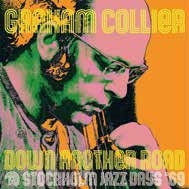When Graham Colliers sextet performed their second studio album at the annual Stockholm Jazz Days Festival, British jazz was finally coming into its own. During the early 1960s, a number of younger players -- Collier, Neil Ardley, John Surman, Stan Tracey, Mike Westbrook, Ian Carr, and others -- established a new aesthetic that presented a modern, skillful jazz alternative to the countrys inferior attempts following WWII. Colliers band was among the first of this new breed of British ensembles to perform on the global jazz festival circuit. This sextet -- Collier on double bass; John Marshall on drums; Harry Beckett on trumpet; Nick Evans on trombone; Stan Sulzman on saxophones, and Karl Jenkins on piano and oboe -- appeared on the studio version of Down Another Road, and were in the middle of a summer support tour when Swiss Radio captured this gig with its ultra-capable recording technicians.
The running order reflects the studio album with one exception: the originals abstract "Danish Blue" was replaced just before showtime by the 14-minute vanguard modal groover "Burblings for Bob." The punchy head offered by Collier, Jenkins, and Marshall introduces the horns before Evans goes afield in his solo. Upon return, he joins in knotty interplay with Beckett and Sulzman before they deliver fine solos. "Molewrench" is introduced with a mutant Afro-Cuban son groove from the rhythm section and horns. Marshall syncopates and inverts the backbeat as Colliers flamenco-tinged bassline frames a wrenching oboe solo from Jenkins. The latters "Lullaby for a Lonely Child" (the only tune not composed by Collier) is born as a deep blue rhumba. Brass and reeds offer a languid vamp as Collier walks alongside the melody and Marshall offers rhythmic invention on a strolling blues. The title tracks piano intro simultaneously recalls the funky underpinnings of Horace Silver and Ramsey Lewis before everyone takes the vamp deep, then underscores and extrapolates on it in resonant solos. "The Barley Mow" is quietly dramatic. The horns and oboe offer a nearly melodic modal intro that weds the sounds of Celtic and Middle Eastern folk to mournful Western blues. The tune slowly unfurls to reveal tense foreboding juxtaposed against intimate lyric beauty. Colliers bass paces the band and introduces new sections with an elegant authority. Closer "Aberdeen Angus," introduced by a piano, snare, and bass vamp, briefly recalls Vince Guaraldi, though Collier is clearly inspired by Art Blakey & the Jazz Messengers as his composition stitches together hard bop, mambo, and funky soul-jazz. Becketts wonderfully articulated solo all but steals the show. Impeccably recorded, the source tapes were painstakingly remastered by the Gearbox team; the unearthed album also includes an excellent liner essay from Collier biographer Duncan Heining. Down Another Road @ Stockholm Jazz Days 69 joins last years previously unissued Hamburg 1968 as an indispensable entry in Colliers posthumous catalog. It extends his legendary reputation not only as a brilliant composer, but as an excellent bassist and bandleader, too. Further, the quality of the music here should be of interest to modern jazz fans. ~ Thom Jurek
Rovi



